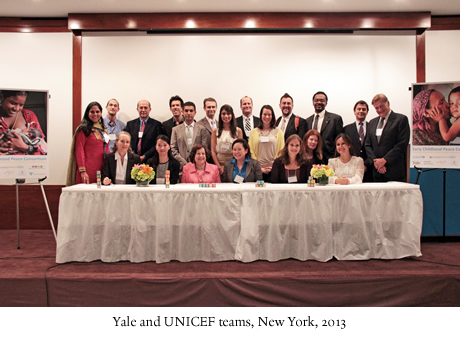Formative Childhoods and Peace Building
How might a new generation of children and youth promote peace in the world today? This research and advocacy question asks us to better understand the links between early childhood development, violence reduction, and peace building on a global stage.
Ongoing projects:
ESF Forum: Yale faculty such as James Leckman and Catherine Panter-Brick are convening a think-tank of scholars across multiple disciplines to: (1) assess the role of family dynamics and early child development in the process of peace building; and (2) explore novel approaches to translating science-based knowledge into concrete action within peace building initiatives. The Ernst Strüngmann Foundation (ESF) funds this week-long event in Frankfurt, October 2013. Contributions will be published in an edited volume by MIT Press. See News.
http://www.esforum.de/forums/esf15_formative_childhoods.html
 Early Childhood Peace Consortium: This consortium brings together leaders in effective practice, new and emerging knowledge, finance, philanthropy and international policy to create a legacy of sustained peace, drawing on the transformative force of ECD. The first general meeting of the consortium convened in September 2013, at the United Nations in New York. See News.
Early Childhood Peace Consortium: This consortium brings together leaders in effective practice, new and emerging knowledge, finance, philanthropy and international policy to create a legacy of sustained peace, drawing on the transformative force of ECD. The first general meeting of the consortium convened in September 2013, at the United Nations in New York. See News.
Yale-AÇEV partnership: Yale faculty have partnered with the AÇEV Foundation on joint projects, led at Yale by Professors James Leckman and Catherine Panter-Brick, and at UNICEF by Dr. Pia Britto. Evidence on the linkages between violence reduction and early childhood interventions was first outlined in a concept note published by AÇEV, articulating a vision for peace through child development: ‘Building a Generation of Reconciliation: The Role of Early Childhood Development in Peace Building.’ The evidence drew upon AÇEV’s parenting initiatives, namely the Father Support Program and the Mother Support Program, which bring together groups of fathers and mothers, respectively, to promote family harmony and democratic values and to reduce violence and abuse.
http://childstudycenter.yale.edu/international/peace.aspx
http://www.empowerweb.org/global-reach/global-grantee-projects/mother-child-education-foundation-acev/
Global Health Leadership Institute: Yale University’s Global Health Leadership Institute brings together select delegations of researchers and decision-makers to address a problem of strategic and practical importance. In June 2013, a five-country meeting included discussion of the content, format, and scale-up of AÇEV parenting interventions in Brazil - a specific exemplar of a strategy that has proven local effectiveness and the potential to be globally disseminated. See conference archives: http://ghli.yale.edu/galleries/2013-conference
Evidence-based research:
A database of the multi-disciplinary research on ECD and peace building has been created.
An Internet poll was run to ascertain expert agreement on the hypothesis that ECD is a pathway to peace.
A systematic review was conducted to evaluate the evidence base for father-led parenting interventions.
The hypotheses proposed by the partnership are being tested through program evaluation.
Documents and publications:
“A Game Change in Parenting Interventions: A Systematic Review of the Global Evidence Base on Father Engagement and Recommendations” (submitted for publication).
Resilience in Child Development: Interconnected Pathways to Wellbeing. Panter-Brick C and Leckman J (2013). Journal of Child Psychology and Psychiatry 54:4, 333-336.
A Brief note on the Ecology of Peace.
